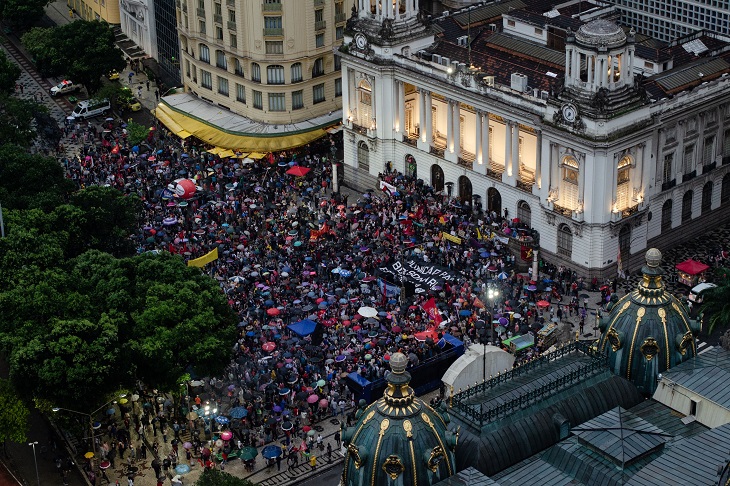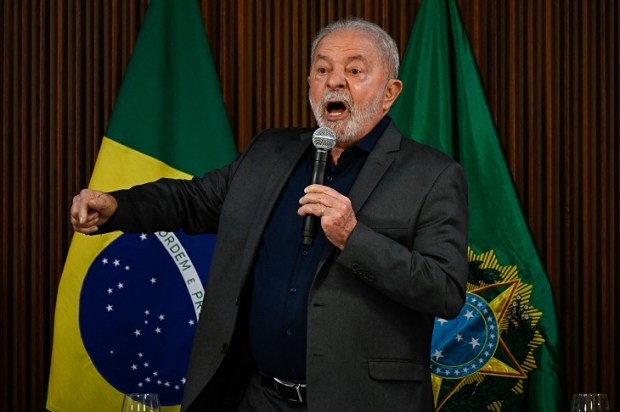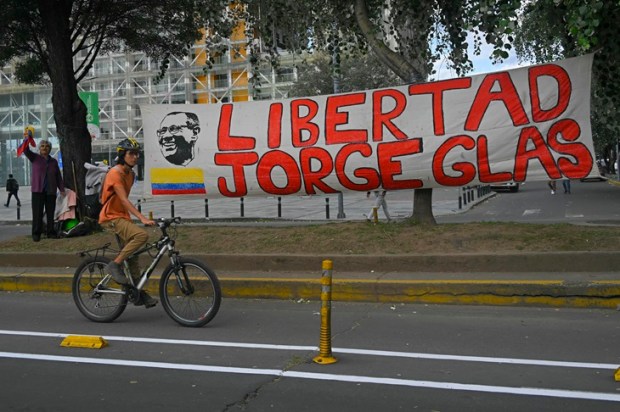Thousands of Brazilians have occupied this Sunday their country’s Congress to protest against the election and inauguration of far-left presidential candidate Lula da Silva. Thousands of others have gathered outside the presidential palace and the Supreme Court. They are calling for the immediate cancellation of the election.
Lula was sworn as the new President of Brazil on January 1. He had been the nation’s elected President from 2002-10. Lula, who has served prison time for his involvement in corruption, apparently won 50.90 per cent of the vote and the conservative candidate, Jair Bolsonaro, received 49.10 per cent.
It was an unexpected comeback for the far-left politician who was responsible for the biggest series of corruption scandals in the nation’s history. Writing for the Wall Street Journal, Mary Anastasia O’Grady reminds us that:
‘The evidence against Lula was solid and his conviction had been confirmed by two appeals court. But the high court reversed its own precedents and annulled the decision. It knew that the statute of limitations didn’t leave time for a retrial. Lula was released but never exonerated.’
Millions of Brazilians have been protesting Lula’s alleged victory since October 30. The spontaneous mass movement has spread around the nation and has no defined national leaders. Many demonstrators are elderly, with a significant presence of young people and families. Above all, these protesters in Brazil are motivated by a strong belief that the presidential election suffered from massive electoral fraud.
On November 9, 2022, the nation’s Defence Ministry sent to the Superior Electoral Court (TSE) its long-awaited report on the electoral process. Produced by the technical team of the Brazilian Armed Forces, the report did not reject the possibility of electoral fraud. The report indicated important aspects that required further clarification from the Supreme Electoral Court, basically because, according to the report:
- there was a possible risk to security in the generation of electronic voting machine programs due to the occurrence of access of computers to the TSE network during the compilation of the source code;
-
the functionality tests of the electronic ballot boxes (Integrity Test and Pilot Project with Biometrics) were not sufficient to rule out the possibility of the influence of any malicious code capable of altering the functioning of the voting system; and
-
there were restrictions on the adequate access of technicians to source code and software libraries developed by third parties, making it impossible to fully understand the execution of the code, which covers more than 17 million programming lines.
In order to avoid a distortion of the findings, the Ministry of Defence issued an official note on November 10 to inform that ‘the accurate work of the team of military technicians in the supervision of the electronic voting system … does not exclude the possibility of fraud or inconsistency in electronic voting machines and the electoral process of 2022’.
According to the Ministry of Defence, ‘It is not possible to ensure that the computer programs that have been implemented at electronic voting machines are free from malicious insertions that alter their functioning.’
As a result, the Ministry of Defence requested the Superior Electoral Tribunal ‘to conduct an urgent technical investigation into what happened in the compilation of the source code and a thorough analysis of the codes that were executed in electronic voting machines’. In a letter in which information is requested for the Superior Electoral Tribunal, the Minister of Defence, Army General Paulo Sérgio Nogueira, commented:
‘From the work done, I make two points. First, it was observed that the occurrence of network access, during the compilation of the source code and consequent generation of programs (binary codes), can configure a relevant risk to the security of the process. Second, from the functionality tests, conducted through the Integrity Test and the Pilot Project with Biometrics, it is not possible to affirm that the electronic voting system is exempt from the influence of any malicious code that may alter its functioning.’
Unfortunately, the request from the Ministry of Defence was completely ignored by Justice Moraes. Furthermore, the Superior Electoral Court rejected any voter fraud claims from Bolsonaro’s political party (Liberal Party) in November. The Court justice who made the ruling, Alexandre de Moraes, described the legal filing as ‘bad faith’ litigation and fined the plaintiffs $4.3 million for simply daring to ask the court’s opinion about the election results!
But a bit of context is important so as to clarify the nature of the problem.
Justice Alexandre de Moraes was appointed as the nation’s top electoral officer in August 2022. Prior to this, he was appointed by President Lula to join the first composition (biennium 2005-07) of the National Council of Justice (CNJ).
From 2002-05, Moraes served as the Secretary of Justice and Defense of Citizenship of São Paulo state under Geraldo Alckmin, the candidate for Vice President on Lula’s presidential ticket, and who had previously served as the Governor of São Paulo from 2001-06, and then again from 2011-18.
Moraes also held the post of Public Security Secretary under Governor Alckmin, from 2014-16. As reported by the French daily Le Monde, seven years ago he was at the centre of a controversy when the daily Estadão published an investigation showing that he had intervened as a lawyer in at least 123 legal cases to defend a corporation (Transcooper) suspected of being linked to Brazil’s main drug trafficking group, the First Command of the Capital (PCC).
During this year’s presidential campaign, Justice Moraes ordered social networks to remove thousands of posts and arrested numerous supporters of former President Jair Bolsonaro without a trial for posts on social media that he claims ‘attacked Brazil’s institutions’, namely his own court. Writing for the New York Times on 26 September, US journalists Jack Nicas and André Spigariol explain that these arbitrary rulings, ‘…could have major implications for the winner of the presidential vote.’
Curiously, one of the materials censored by Moraes refers to a 2018 federal police inquiry which investigated how hackers might have attacked the computers of the Superior Electoral Tribunal. In addition to sending some of former President Jair Bolsonaro’s friends and supporters to jail, Moraes has ordered the confiscation of their electronic devices and the freezing of their personal bank accounts. As stated by congresswoman Bia Kicis:
We are living in dark times of brazen attack on democracy. Don’t forget the people who are celebrating the abuses of authority and undemocratic acts by Justice Alexandre de Moraes against journalists, comedians, businessmen and any other common people. They are accomplices of the dictatorship. I have never been silent against tyranny or opponents.
Of course, these judicial rulings are entirely arbitrary and unconstitutional. Supreme Court justices are expected to uphold the law and Brazilians have a very clear constitutional right to protest politically. Under Article 1 of the Brazilian Constitution, all power belongs to the people, who exercise such power by means of their elected representatives or directly. This constitutional right is also protected under Article 5, IV of the Constitution, which communicates that the free manifestation of political thought.
Finally, there is also Article 5 of the Brazilian Constitution stating that international human rights treaties and conventions which are approved in each House of the National Congress shall be equivalent to constitutional amendments. In this context, freedom of political speech in Brazil has been entirely guaranteed by Article 13 of the American Convention on Human Rights, which has been turned into domestic law through Federal Decree No. 678 of 1992.
Apparently, however, nobody in Brazil has been allowed to question the transparency of the recent presidential election. Whoever dares to do so ‘will be treated like criminals’, admonishes Justice Moraes. On December 14, he warned that ‘many people still need to be arrested and a lot of fines to be issued’. Such a statement was made following a comment by another Supreme Court justice, Dias Toffoli, concerning arrests and fines in the United States as a result the ‘attack’ on the US Capitol, in January 2021, as well as the alleged dissemination of ‘fake news’ by American conservative thinkers.
This is how brutal dictatorships start. At this moment hundreds of judicial arrests are taking place across Brazil. The unelected judiciary has now moved on to a new phase of political activism, and the federal police keep carrying out the arrest of people on solely ideological grounds. As stated in an insightful article in the New York Times, ‘Justice Moraes has acted unilaterally, emboldened by new powers the court granted itself in 2019 that allow it to, in effect, act as an investigator, prosecutor and judge all at once.’
The Brazilian Constitution directly refers to the principle of parliamentary immunity. Article 53 of the Brazilian Constitution says that congresspersons shall ‘enjoy civil and criminal immunity for any of their opinions, words and votes’. However, on April 20, the Supreme Court decided by 10 votes to one to sentence congressman Daniel Silveira to eight years and nine months in prison for ‘posting insults’ against members of that court on social media. Justice Moraes, who acted as rapporteur, downplayed the defence’s argument that the lawmaker’s remarks fell under the umbrella of ‘parliamentary immunity’. Justices of the Supreme Court, who effectively acted as investigators, judges and executors in their own cause, also imposed a heavy fine of US$ 41,600 on this MP in addition to requesting the removal of his parliamentary status.
Similarly, on November 4, the congressperson elected with the most votes in the country, Nikolas Ferreira (Liberal Party, Minas Gerais State) had his Twitter account suspended by force of a judicial ruling. This elected politician had posted the link to a document produced by Argentine journalist Fernando Cerimedo, who appears to show that voting machines produced before 2020 ‘would not be auditable and counted fewer votes for President Bolsonaro’.
In a televised address on Sunday, newly inaugurated President Lula has authorised federal intervention in the Federal District until the end of January. He also tweeted a statement calling those who occupied Congress ‘fascists’. The controversial election of the notorious far-left politician was encouraged by the oligarchic power leadership and all the globalist forces of the world. Writing on Twitter, President Macron, reacting to the protests in Brazil, said that Lula could count on France’s ‘unfailing support’.
To conclude, the latest events in Brasília are a result of a spontaneous reaction against an electoral process that millions of Brazilians perceive as being completely lacking in transparency and credibility. Amid allegations of massive electoral fraud, these concerned citizens have been protesting in their millions over hundreds of cities nationwide. The problem is that millions of Brazilians do not trust the Electoral Court and believe that such court is part of the electoral fraud scheme in this presidential election.
Augusto Zimmermann PhD, LLB, LLM, CIArb is professor and head of Law at the Sheridan Institute of Higher Education, in Perth. Zimmermann is also a former Commissioner with the Law Reform Commission of Western Australia. He is an expert in Brazilian law and the author of numerous books and articles on Brazilian Constitutional Law, including Direito Constitucional Brasileiro – Tomes I & II (Rio de Janeiro/RJ: Lumen Juris, 2014) 1,000 pp – ISBN 978-85-675-9505-4, and Curso de Direito Constitucional (4th ed., Rio de Janeiro: Lumen Juris, 2006) xxx + 788 pp – ISBN 85-7387-256-X.
Got something to add? Join the discussion and comment below.
Get 10 issues for just $10
Subscribe to The Spectator Australia today for the next 10 magazine issues, plus full online access, for just $10.


























Comments
Don't miss out
Join the conversation with other Spectator Australia readers. Subscribe to leave a comment.
SUBSCRIBEAlready a subscriber? Log in